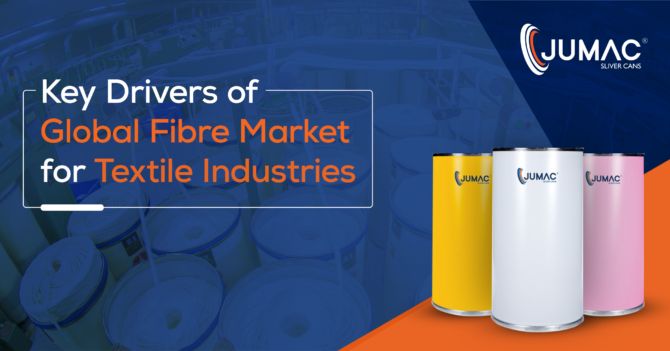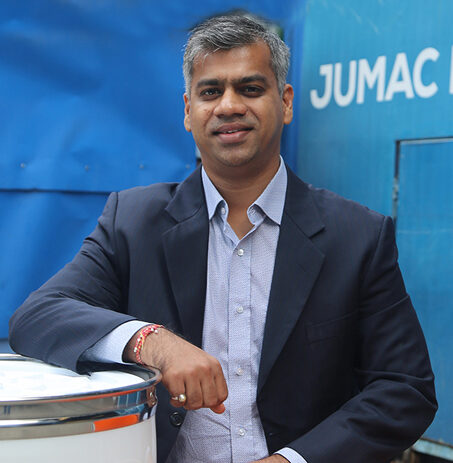The world might be showing early signs of recovery from…

Key Drivers of Global Fibre Market for Textile Industries
In 2017, the value of the Indian textile industry was around US $150 billion. By the end of 2021, that figure is estimated to zoom past the $220 billion figure. The robust growth of this sector is in sync with the rapid proliferation of the worldwide textile market, which was worth more than $1000 billion in 2020. Spinning cans manufacturers are a major contributor the the textle industry as well.
Natural fibres, polyesters and nylon are the main components of the global textile market. Among these, the market for eco-fibres warrant particular attention. The CAGR of the eco-fibre market worldwide over the 2019-2025 period is expected to hover around the 9.1%-9.2% mark. Availability of high-quality tools and machinery for the textile industry, including HDPE spinning cans, has been instrumental in improving spinning quality. We will here take you through the key drivers of the global fibre market for textile industries:
Rising Demand & Per Capita Consumption Of Fibre
The total demand for eco-fibres, along with their per capita use, has been rising exponentially over the last few years. The rise in average disposable income of households, together with constantly evolving textile trends, is expanding the global fibre market rapidly. The growing urbanisation worldwide (according to reports, urban population made up approximately 67% of the total population count in 2020) is also instrumental in pushing up overall demand levels of high-quality fibres and textiles. Both consumers/buyers as well as retailers are looking for greater variety in fibres and yarns, The favourable demographics and the consolidation of organised retail services are providing a tremendous boost to this sector.
Easy, Competitive Production Opportunities
The diminishing volume of cultivable land across the world, thanks to global warming and other climate-changing phenomena, is one of the biggest challenges that the fibre market is facing. This potential roadblock is, however, being offset by the ready availability of high quality raw materials. Virtual mediums have also ensured that there is no paucity of these raw materials. Man-made fibres can be easily derived from these sources, as well as from MMF recycling procedures. Leading yarn spinning cans leader companies are constantly researching to tweak the properties of the materials, to deliver quality fibres and ensure complete customer satisfaction. The growing flexibility in fibre designing is also widening the usability of fibres in diverse applications.
Steadily Growing Competitive Advantages
The worldwide market for eco-fibres is also being fueled by a slew of key competitive advantages. The Indian textile industry, in particular, has a comparatively lower average cost of manufacturing – with skilled manpower being available in abundance at competitive rates. By 2020, the textile sector was already providing employment to well over 45 million people (the industry also contributes an impressive 12% to the country’s total export volume). Given the market potential, the spurt in the number of reliable spinning cans manufacturer companies is understandable. Different renewable materials – like organic cotton, hemp and jute – are being used for producing eco-fibres of the finest quality, while keeping the entire model sustainable. This enhanced sustainability is driving the fibre market further.
Resolution Of Environmental Concerns
In the face of growing environmental concerns and threats, the demand for eco-friendly cellulosic fibre varieties is increasing fast. The best spinning can manufacturers, like Jumac spinning cans, are regularly using re-designed HDPE cans, high-quality springs and other accessories, ensuring superior load capacities and minimal environmental burdens. Maintenance expenses are also being managed with care, and the focus is squarely on making the production cycles more efficient. In spite of making up nearly one-third of the global fibre market, cotton production occupies a meagre 3% of the aggregate volume of arable land. In order to counter this, the biggest players are making a conscious effort to maximise the production per acre, by using the latest scientific agricultural practices.
Growing Role Of Technology & Usage Of Spinning Cans
Innovation has undoubtedly emerged as a key driver of the fibre and textile markets. Digital transformation is making this sector more competitive than ever before. There has been high-volume investments on technological upgradation – and more time & resources are being spent on R&D and the framing of cost-optimisation strategies. Manufacturers of spinning cans are looking to produce high-quality products through process-driven models at their state-of-the-art manufacturing facilities. End-to-end support is being provided to streamline all processes – right from enhancing textile manufacturing standards to creating compact process controls. Testing and quality monitoring tools are also becoming increasingly advanced. As the fibre industry is becoming more ‘intelligent’, ROI figures are going up.
Recommended Reading: The Role of Consistent & Stable Spring In The Sliver Handling System
Robust Government Body Support
In the last few years, there have been several favourable governmental initiatives and regulations for producing bio-based products. These have been backed by quite a few schemes and sizable FDI (foreign direct investment) policies. Official plans have also been set in motion, to bolster both the technical textiles as well as the man-made fibre sub-sectors. With growing FDI availability, fibre and textile manufacturing hubs are growing at a rapid clip. The increasing volume of private equity in this sector is fostering development and taking fibre and textile production standards to the next level.
Cumulatively, the apparel and textile sector contributes close to 2.5% of India’s GDP. From household/personal use, to packaging industries and the auto sector – the scope of eco-fiber usage is constantly expanding. The burgeoning demand, coupled with favourable governmental regulations and world-class spinning cans delivered by leading spinning can manufacturers, is all set to boost the global fibre market further in the foreseeable future.

Passionate about transforming the industrial sector of textile and spinning industry with innovative solutions. Director at Jumac Manufacturing, leading spinning cans and accessories manufacturer and exporter from Kolkata, India.









